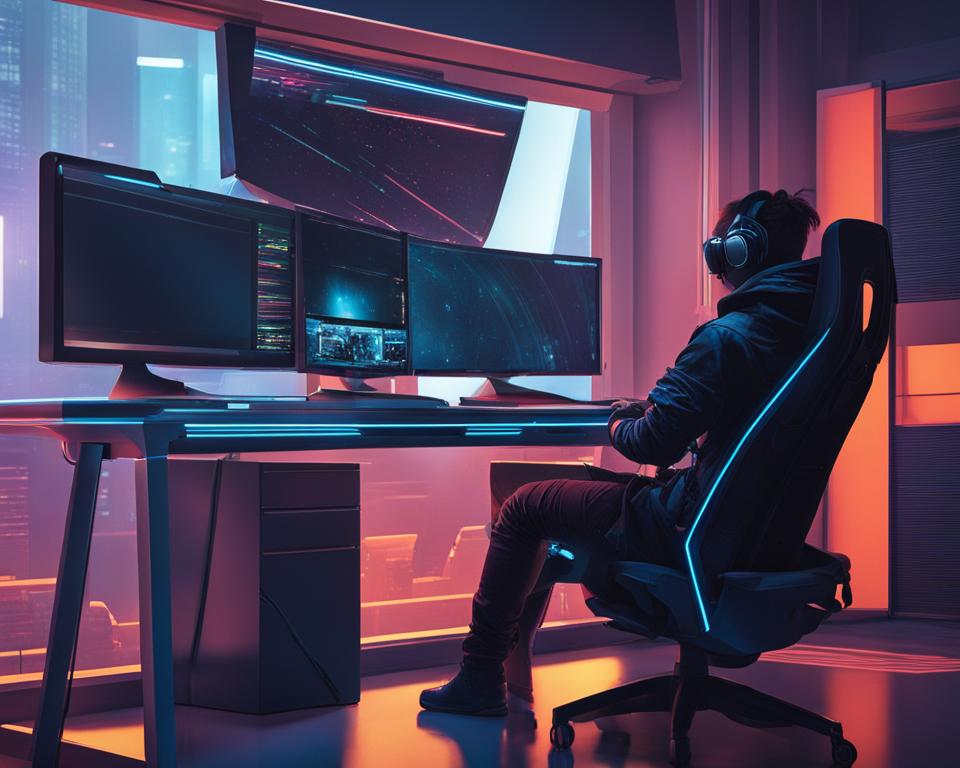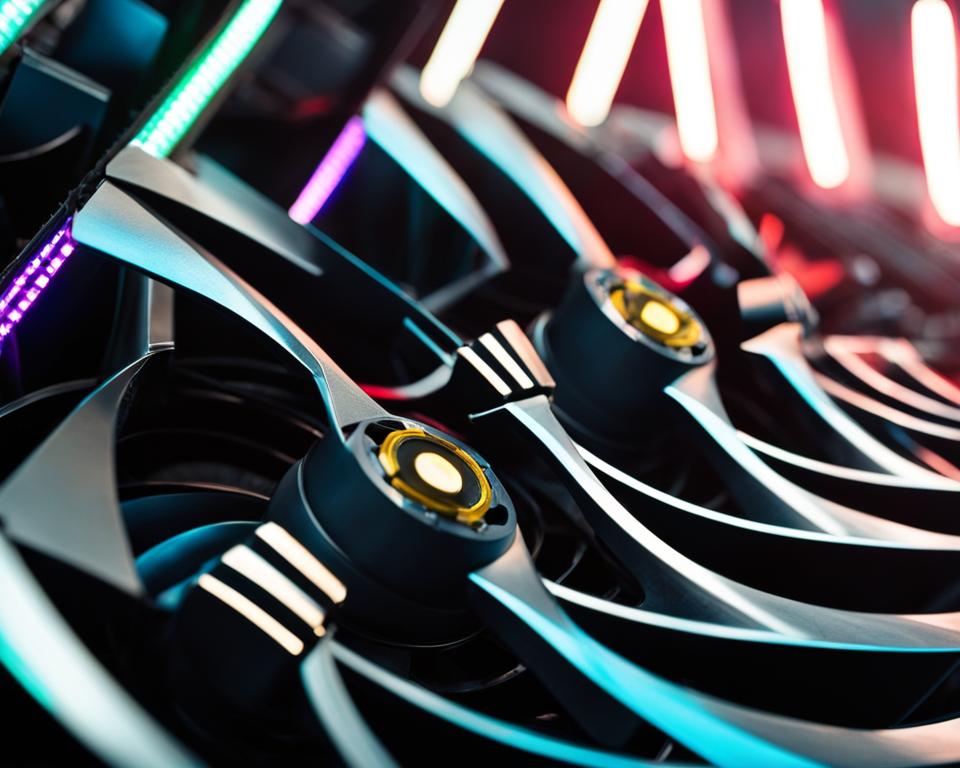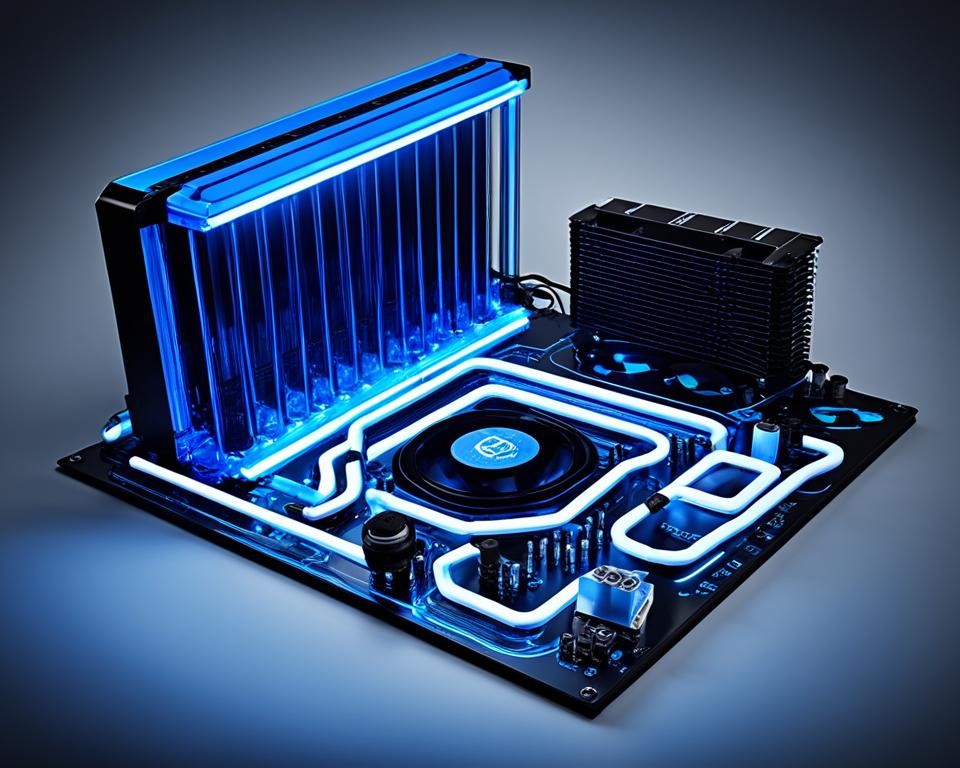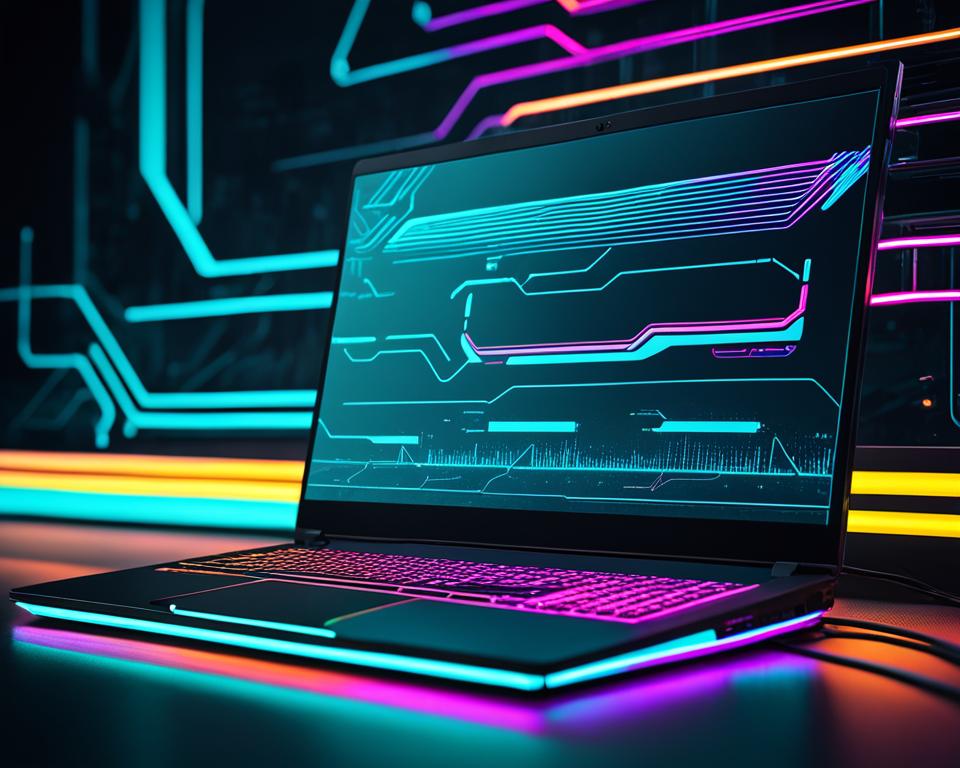As gamers, we know the exhilaration of diving into intense virtual worlds and battling it out with friends or foes. But with great gaming comes great heat, and keeping our gaming rooms cool is crucial for optimal performance and prolonging the lifespan of our cherished gaming systems.
Imagine this: It’s a scorching summer day, and Joe, an avid gamer, has just set up his gaming room for an intense day of online battles. The sun is beating down outside, and the room is already starting to feel like an oven. Joe fires up his gaming PC, and before he knows it, things start to slow down. The game lags, the graphics stutter, and frustration sets in.
Like Joe, many gamers face the challenge of keeping their gaming setups cool. Excessive heat can not only lead to performance issues but also cause potential damage to the components of our precious gaming systems. But fear not, fellow gamers, for there are practical and effective strategies to keep your gaming room cool and your gaming experience top-notch.
Key Takeaways:
- Keep your gaming system away from direct sunlight and heat sources.
- Ensure proper ventilation and airflow around your computer.
- Regularly clean and maintain your fans to optimize cooling performance.
- Consider upgrading to a water-cooling kit for high-demand systems.
- Optimize your PC or laptop settings and keep your software updated.
Position Your Computer in the Correct Place

To help keep your computer cool, it’s important to position it in the correct place. By following these guidelines, you can prevent overheating and ensure optimal performance for your system.
Avoid Direct Sunlight
Placing your desktop or laptop in direct sunlight can significantly increase the heat stress on your system. Sunlight can quickly raise the temperature inside your computer and cause it to overheat. To prevent this, position your computer away from windows or direct sunlight exposure.
Remove Airflow Restrictions
To maintain proper airflow, it is crucial to remove any obstacles or restrictions around your computer. Ensure that there is enough space around your desktop or laptop, allowing for adequate ventilation. Leave two to three inches of space on all sides of the computer’s vents to promote efficient airflow and prevent heat buildup.
Choose the Right Surface
For laptop users, using a flat and hard surface is recommended. This allows air to flow freely underneath and around your laptop, helping to dissipate heat more effectively. Avoid soft surfaces like beds or couches as they can block airflow and contribute to overheating.
Tip: If you prefer using your laptop on the go, consider using a cooling pad, which can further enhance the airflow and help keep your device cool.
Visual Representation of Cooling Tips
The following table provides a visual representation of the cooling tips discussed in this section:
| Positioning Tips | Description |
|---|---|
| Avoid Direct Sunlight | Keep your computer away from windows or direct sunlight. |
| Remove Airflow Restrictions | Ensure there is sufficient space around your computer for proper ventilation. |
| Choose the Right Surface | Use a flat and hard surface for laptops to allow for better airflow. |
Note: The table above provides a visual overview of the main position-related cooling tips discussed in this section. Implementing these strategies can help maintain optimal temperatures and prevent overheating.
By positioning your computer correctly, preventing direct sunlight, and removing airflow restrictions, you can significantly improve the cooling efficiency of your system and avoid potential overheating issues.
Close Your System’s Case
Contrary to popular belief, keeping your computer’s case closed actually helps regulate internal temperatures. Closing the case allows the internal cooling system to function properly and maintain the reliability of your components. It also reduces the amount of dust and debris that can accumulate on the cooling fans, which can impede their performance over time. Regularly clean the fans and vents to prevent dust buildup and keep them functioning optimally.
Why Closing Your Computer’s Case Is Important
When it comes to cooling your computer, closing the case is a critical step. The case acts as a protective enclosure that helps manage the airflow and maintain the optimal temperature inside. By keeping the case closed, you prevent any external factors, such as environmental dust or debris, from entering and interfering with the internal cooling system.
This effectively minimizes the risk of overheating and ensures that your components can operate at their best. Additionally, closing the case helps create a controlled environment where the cooling fans can efficiently do their job, preventing any potential disruptions or malfunctions.
The Importance of Regular Cleaning
To maintain the efficiency of your computer’s cooling fans, regular cleaning is essential. Over time, dust and debris can accumulate on the fans and vents, hindering their ability to generate sufficient airflow. This can result in increased temperatures and reduced cooling performance.
To prevent dust buildup, make it a habit to clean your computer’s fans and vents at regular intervals. Use compressed air or a soft brush to remove any accumulated dust or debris gently. By keeping these components clean, you can ensure maximum airflow and optimal cooling performance.
Benefits of Closing Your Computer’s Case
Closing your computer’s case offers several benefits, including:
- Improved cooling: By preventing ambient dust and debris from entering the system, the internal components can stay cooler and operate more efficiently.
- Reduced maintenance: A closed case reduces the frequency at which you need to clean the cooling fans and vents, saving you time and effort.
- Extended component lifespan: Proper cooling helps prolong the lifespan of your computer’s components by preventing excessive heat-related wear and tear.
| Benefits of Closing Your Computer’s Case | Explanation |
|---|---|
| Improved cooling | Prevents ambient dust and debris from entering the system, enabling efficient cooling. |
| Reduced maintenance | Less frequent cleaning of cooling fans and vents. |
| Extended component lifespan | Prevents excessive heat-related wear and tear. |
By ensuring your computer’s case is closed, you can maximize its cooling efficiency, prevent dust and debris buildup, and prolong the lifespan of your components. Incorporate this simple practice into your routine maintenance to keep your computer running smoothly and reliably.
Maintain Your Fans

The fans in your computer play a crucial role in cooling down the system. Dust and dirt can accumulate on the fans, affecting their performance. It is important to regularly clean the computer fans to ensure optimal airflow and cooling efficiency.
“Regularly clean the fans using canned air to remove any debris.”
Dust can obstruct the fan blades, reducing their ability to generate sufficient airflow. Using canned air to blow away the dust will help improve the cooling capacity of your computer. Be sure to hold the canned air canister upright and use short bursts of air to avoid damaging the fans or other components inside your computer.
“Upgrading your CPU fan can also help keep CPU temperatures down.”
If you find that your CPU fan is struggling to keep up with the cooling demands of your system, consider upgrading to a more powerful and efficient CPU fan. Upgrading your CPU fan can improve heat dissipation and ensure that your CPU operates at safe temperatures even during intense gaming sessions.
To further enhance airflow within your computer, you can add additional case fans. These fans can be strategically placed to draw in cool air and expel hot air, creating a better circulation of air throughout the system. This can effectively reduce overall temperatures and prevent overheating in critical components.
Don’t overlook the importance of checking your power supply fan as well. The power supply fan is responsible for pushing hot air out of the system. If this fan becomes clogged or malfunctions, it can lead to increased temperatures and potential system instability. Regularly inspect and clean the power supply fan to ensure optimal performance and cooling efficiency.
By properly maintaining and upgrading your computer fans, you can significantly improve the cooling capabilities of your system and protect your components from overheating.
Benefits of Maintaining Your Fans:
- Prevents overheating and potential damage to components.
- Improves overall system performance and stability.
- Extends the lifespan of your computer.
Upgrade to a Water-Cooling Kit

For high-performance computers, such as gaming rigs, the heat generated by top-end CPUs and GPUs can often overwhelm even the fastest fans. In these demanding situations, a water-cooling kit can provide a more effective solution. Water cooling kits utilize a pump to circulate cold water around the CPU through self-contained tubes, efficiently dissipating heat and maintaining optimal temperatures.
Not only are water-cooling kits suitable for desktop PCs, but they also offer cooling options for portable gamers using laptops. By implementing a water-cooling kit, users can experience enhanced cooling performance, enabling their systems to handle high-demand tasks without the risk of overheating.
It is important to note that installing a water-cooling kit requires technical expertise. Therefore, it is recommended to seek professional assistance or consult comprehensive technical resources during the installation process.
The Advantages of Water-Cooling Kits
A water-cooling kit provides several advantages over traditional air cooling methods. Let’s explore these benefits:
- Efficient Heat Dissipation: Water-cooling kits have a higher heat capacity compared to air coolers, allowing for more efficient heat dissipation. This helps to prevent overheating and maintain optimal system temperatures.
- Lower Noise Levels: Water-cooling kits operate more quietly compared to traditional fan-based cooling systems. This is especially advantageous for gaming and other activities that require a quiet environment.
- Improved Aesthetics: Water-cooling kits can enhance the visual appeal of a high-performance computer setup. The sleek design and illuminated components add a touch of elegance to any gaming rig.
Water-cooling kits offer superior cooling performance, making them the preferred choice for gamers and users with high-demand systems. With their ability to efficiently dissipate heat and maintain optimal temperatures, these kits provide a reliable solution for keeping your computer cool during intense gaming sessions.
| Advantages of Water-Cooling Kits | |
|---|---|
| Efficient Heat Dissipation | ✔ |
| Lower Noise Levels | ✔ |
| Improved Aesthetics | ✔ |
These advantages make water-cooling kits a desirable option for those seeking optimal cooling performance for their high-performance systems. However, it is essential to note that proper maintenance and regular cleaning are necessary to ensure the longevity and effectiveness of the water-cooling kit.
Proper Maintenance and Cleaning
To keep your water-cooling system running smoothly, you should follow these maintenance tips:
- Regularly check and clean the water blocks and radiators to remove any accumulated dust or debris.
- Monitor the coolant levels and top up if necessary to ensure efficient heat transfer.
- Perform regular leak tests to identify any potential issues before they cause damage to the components.
By incorporating these maintenance practices into your routine, you can enjoy the benefits and longevity of your water-cooling kit.
Optimize Your PC or Laptop Settings

If you’re experiencing overheating issues during everyday tasks, optimizing your PC or laptop settings can help. Making a few adjustments to your computer’s settings can significantly reduce energy consumption and heat generation, improving overall cooling efficiency.
Adjusting Display Settings
Lowering the brightness and screen resolution can have a significant impact on the energy usage and heat generated by your display. By reducing these settings, you can decrease the workload on your graphics card, resulting in lower temperatures. Adjusting the display settings is especially beneficial for long gaming sessions or resource-intensive tasks.
Managing Power Options
Managing power options effectively allows you to strike a balance between performance and energy efficiency. Changing your power settings to a balanced mode can help prevent unnecessary overheating. In this mode, your system will dynamically adjust its performance based on the demands of the task. It ensures that your device operates optimally while minimizing heat generation.
Regularly Update Software and Operating System
Regularly checking for and installing software and operating system updates is crucial for maintaining an efficient and cool-running system. These updates often include bug fixes, performance enhancements, and optimizations that resolve inefficiencies contributing to overheating. Keeping your software up to date not only improves stability but also enhances energy efficiency, resulting in lower operating temperatures.
Summary Table: Optimizing PC or Laptop Settings for Cooling
| Optimization Techniques | Benefits |
|---|---|
| Lower brightness and screen resolution | – Reduces energy consumption and heat generation – Relieves strain on the graphics card |
| Manage power options | – Balances performance and energy efficiency – Prevents unnecessary overheating |
| Regularly update software and operating system | – Fixes bugs and resolves inefficiencies – Improves system stability and energy efficiency |
By optimizing your PC or laptop settings, you can proactively address overheating issues and ensure a cooler and more reliable computing experience. Adjusting display settings, managing power options, and keeping your software up to date are simple yet effective strategies for maintaining optimal temperatures.
Keep Your Software Updated
One crucial step in managing overheating issues is consistently updating your software and operating system to the latest versions. Software updates not only provide bug fixes but also include performance improvements that can reduce the workload on your hardware and enhance the speed of your computer. By resolving inefficiencies and optimizing energy consumption, these updates contribute to a cooler and more efficient system.
Shut Down Your Computer
From time to time, giving your computer a break by shutting it down can help cool it down. When you boot it up again, it will start from a cold state, and everything should run more smoothly. If the overheating issue persists, it’s important to apply some of the previously mentioned steps or consider upgrading to a computer that can better meet your demands.
By shutting down your computer, you allow it to cool down completely. This helps dissipate any heat that may have accumulated during prolonged use. Additionally, shutting down your computer gives it a chance to rest and resets any background processes that may be contributing to overheating.
In some cases, a simple shutdown can resolve minor overheating problems. However, if the issue persists, it may indicate a more significant underlying problem. In such cases, implementing other cooling strategies, such as optimizing settings, maintaining fans, and upgrading cooling systems, may be necessary to prevent further overheating and potential damage to your computer.
Benefits of Shutting Down Your Computer
“Shutting down your computer allows it to cool down completely and rest, improving its overall performance and preventing potential overheating issues.”
Properly shutting down your computer also helps in preventing issues with corrupted files and software. Regularly shutting down your computer can aid in maintaining system stability and preventing potential conflicts or errors that may arise from extended periods of continuous use. Furthermore, shutting down your computer conserves energy and contributes to a greener environment.
When to Shut Down Your Computer
While it’s beneficial to shut down your computer from time to time, you don’t need to do it after every use. Here are some scenarios when you should consider shutting down your computer:
- When you won’t be using your computer for an extended period, such as overnight or during vacation
- After installing updates or new software to allow changes to take effect
- If your computer is exhibiting unusual behavior, such as frequent crashes or slow performance
- When you’re experiencing overheating issues, despite following other cooling strategies
In these situations, shutting down your computer can help resolve issues and promote a cooler and more efficient system.
While shutting down your computer provides a temporary solution to cool down the system, you should also take preventive measures to avoid overheating in the first place. Implementing the tips mentioned in the previous sections, such as optimizing settings, maintaining fans, and positioning your computer correctly, can help prevent overheating and ensure optimal performance during extended use.
Additional Cooling Tips for Laptop Gaming
When it comes to laptop gaming, keeping your device cool is crucial for optimal performance and longevity. In addition to the previously mentioned tips, here are a few extra measures you can take to ensure your laptop stays cool.
Using a cooling pad is an effective way to regulate temperatures and prevent overheating. These pads are equipped with built-in fans that blow cool air upward, helping to dissipate heat and maintain a comfortable temperature for your laptop.
Another important aspect to consider is where you use your laptop. Avoid placing it in direct sunlight, as the heat from the sun can increase the internal temperature of your device. Additionally, using your laptop on soft surfaces like beds or couches can obstruct airflow and trap heat, leading to overheating. Opt for a hard, flat surface that allows for proper ventilation.
Reducing resource usage is another key factor in preventing laptop overheating. Close unnecessary applications and browser tabs that consume CPU power and memory. By lightening the workload on your laptop’s processor, you can minimize heat generation and improve overall performance.



